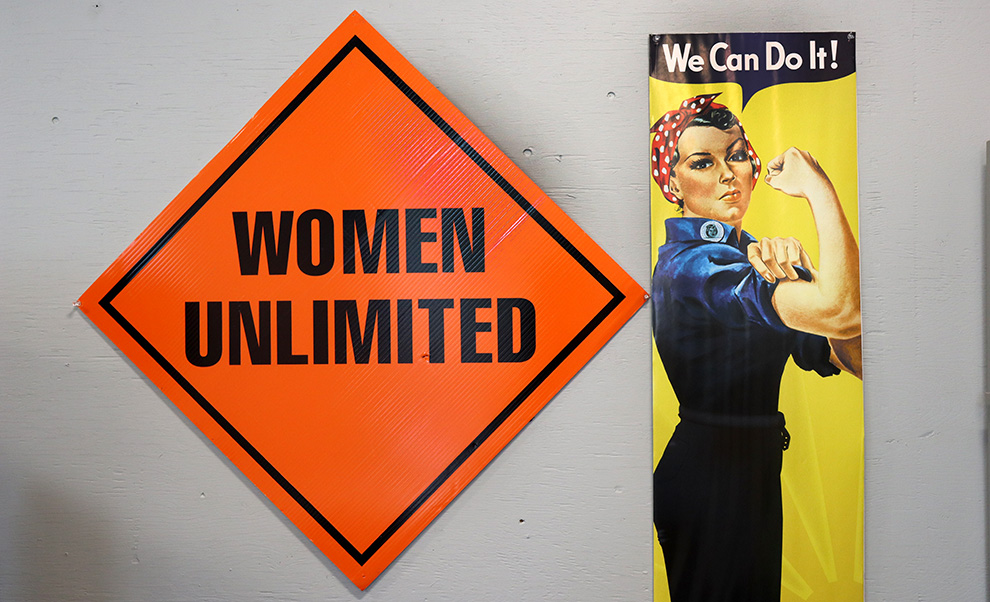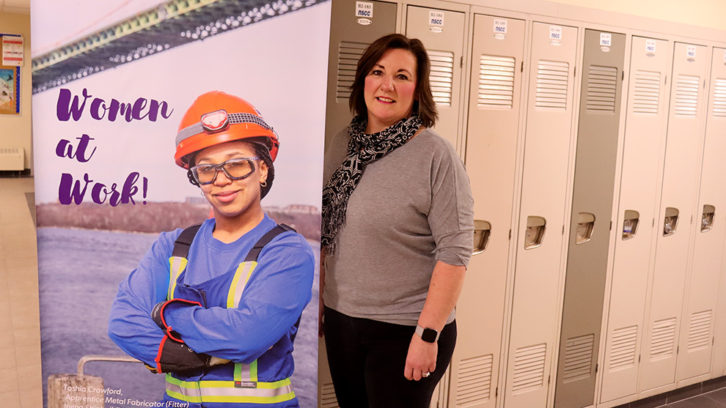Women in trades still struggling with sexist work culture in Nova Scotia
More initiatives are aiming to attract female trades workers, but sexism in the workplace remains 'a huge challenge'

caption
Women Unlimited is a not-for-profit organization in Nova Scotia helping women pursue careers in the trades.A study released earlier this month predicts a looming labour shortage for construction jobs in Nova Scotia, and shows women could play a big part in filling that gap.
A number of large-scale health care projects are slated to break ground in the coming decade, according to BuildForce Canada’s labour market forecast for the province. An estimated 8,300 workers, or 27 per cent of the 2019 construction workforce, are expected to retire.
That same report shows that in 2019, women made up just 3.5 per cent of the 27,100 tradespeople employed in Nova Scotia’s construction industry.
Trent Soholt, executive director of the Nova Scotia Construction Sector Council, said the industry could face major challenges if it doesn’t diversify its workforce.
“And women making up over 50 per cent of the population should be better represented in our construction industry,” said Soholt.
Women Unlimited is a not-for-profit in Nova Scotia devoted to increasing the participation of diverse women in the trades. Among other initiatives, the organization runs a free, 14-week career exploration program that lets participants try different trades in hopes of finding a career path. Their next session starts in March, and Women Unlimited is currently recruiting women for the upcoming program.
The organization also continues its relationships with participants when the career exploration program ends, helping women find apprenticeships, connecting them with employers, and fostering ongoing support networks.
“We recognize that the trades offer really good paying jobs,” said Kelli Skinner, HRM’s workforce development coordinator for Women Unlimited.
Skinner said many women who enroll in the career exploration program previously worked in retail or as servers for minimum wage.
“Whereas in the construction industry or other trades, you typically start off making almost $20 an hour,” she explained.

caption
Kelli Skinner works for Women Unlimited as the workplace development coordinator in HRM.Women Unlimited isn’t the only initiative focused on preparing women for jobs in the trades. On Feb. 13, the federal government announced the Build a Dream Career Exploration Expansion project, which is aimed at female high school students across the country who’d like to pursue skilled trades careers. The Nova Scotia Apprenticeship Agency also runs two programs to help women have “more successful” apprenticeships in the province.
While the number of women in the trades is improving slightly, Skinner said there’s still a long way to go.
“I mean, we’ve (Women Unlimited) been around since 2006 and we’re still only at about 5 per cent of women in the trades,” she said. “It’s tough.”
Where are the women?
Various ideas have been floated about why men vastly outnumber women in the trades.
Perhaps women aren’t aware of the opportunities. Maybe they lack female role models. According to the Nova Scotia Construction Sector Council’s focus group research, these factors do play a part.
But as far as Shawna Henderson is concerned, workplace culture is by far the biggest obstacle.
“I guess the one thing that blows me away is the fact that there are women coming into the industry now facing exactly the same things I did 30 years ago,” said Henderson.
After working in construction for 20 years, in 2013 Henderson founded her company Blue House Energy, which provides online courses for tradespeople. In her years spent on work sites, Henderson said she was often overlooked and underestimated. She also faced many incidents of harassment.
“I’ve been physically threatened on site,” she said. “I’ve been scared for my safety a lot.”
“Certainly verbal harassment was awful. My mom still says, ‘I can’t believe that you speak the way you speak right now.’ I’m like, ‘Oh god, I worked for 30 years in construction.’ The language is horrific, and the only way I could shut people down was to be grosser than them,” Henderson said.
“But there’s zero joy in that. You just want to go and do your business, do your work, and be good at doing your work without somebody suggesting all sorts of disgusting things they’d like to do to your body.”
Skinner agreed workplace culture in the trades can be “absolutely vile.” According to Skinner, sometimes the biggest offenders in the workplace are highly skilled at their jobs, and employers “put up with the crappy behaviour because the person is just a really good technician.”
Sometimes, systemic sexism affects the way workers’ partners treat women in the industry. Skinner said she knows one woman who applied for a job and faced scrutiny from employers’ wives after the first round of interviews. Skinner also met an employer once who, after initially showing interest in hiring women, later returned, “tail between his legs with his wife, and she’s like, ‘We are not hiring any female technicians.’”
The dominance of men in the industry is felt in many ways. As Soholt pointed out, even the washrooms on many construction sites are “largely male focused.”
Changing workplace culture ‘the right thing to do’
Soholt said the workplace culture needs to change on job sites, and “that is something we definitely need to work on collectively.”
While unions can provide some support, Soholt said many construction companies lack unionized environments. The Nova Scotia Construction Centre Council has developed online training programs to promote respectful workplaces, and Soholt said they’re trying to encourage workers and new apprentices to complete the programs.
But for now, it’s often up to individuals to voluntarily complete the training online.
For Henderson’s part, she tries to tackle male-dominated workplace culture by supporting women already working in the trades and championing them as much as possible.
“If you deal with women as much as you deal with men in the industry, it’s going to shift,” Henderson said. “I think having more women in positions of authority like business owners, crew chiefs, and management that’s not administrative will help to change the whole culture.”
Skinner also believes the more women there are in the trades workforce, the more it will help everyone.
She said the other thing she always preaches is that people ask for female technicians.
“If you’re getting your car fixed, hold them accountable,” said Skinner.
“Stand at the service desk and say, ‘I need my oil changed, my winter tires put on, my car’s making this funky noise and oh by the way, do you have a female technician?’”
Skinner said the looming labour shortages are already putting more women apprentices on the radars of employers, and she urges any women interested in her organization’s upcoming career exploration program to get in touch.
“If there are any women out there who are maybe toying with (the idea), by all means reach out to Women Unlimited,” said Skinner.
About the author
Andrea McGuire
Andrea McGuire is a journalism student from Newfoundland. Before coming to King's College, she completed a master's degree in folklore at Memorial...
